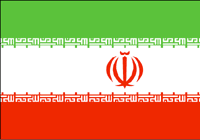Iran takes tough stance during crucial nuclear talks with Russian Federation
Iran took a tough stance Wednesday as it launched a new round of talks with Russia on the Kremlin's proposed uranium enrichment deal an offer aimed at easing Western fears that Tehran is forging ahead with efforts to build an atomic bomb.

The chief Iranian nuclear negotiator said there was no need in spite of Moscow 's insistence for Tehran to resume a moratorium on uranium enrichment activity.
"A moratorium is necessary when there is something dangerous. But all our activities are transparent," Ali Larijani said after arriving at a Moscow airport, speaking through a Russian translator.
The two sides later met at the Golden Ring Hotel, across the street from the Foreign Ministry, for a third round of talks on a Kremlin proposal to enrich uranium for Iran on Russian territory. Igor Ivanov, the secretary of the National Security Council, led the Russian delegation.
After two hours, the talks halted briefly to allow the Iranian delegates to pray, RIA-Novosti news agency reported. No announcement was made about the progress of the talks.
The negotiations were expected to wrap up in the evening, and the Iranian delegation was expected to leave Moscow on Thursday morning, the Interfax news agency reported, citing an unidentified diplomat.
Russia 's top diplomat reiterated Moscow 's call for Iran to return to a moratorium on enriching uranium as a condition for going forward with the Kremlin plan.
"What is necessary is for Iran to come back to the moratorium, to accept the joint venture proposal as a package that would be supported by the members of the governors' board of the IAEA," Russian Foreign Minister Sergey Lavrov told reporters in Budapest, where President Vladimir Putin is on a state visit.
The delegation arrived just five days before a crucial board of governors' meeting at the International Atomic Energy Agency. Monday's meeting of the Vienna-based U.N. nuclear watchdog could start a process leading to punishment by the U.N. Security Council, which has the authority to impose sanctions on Iran .
Further action has been deferred until the end of next week's meeting at the insistence of veto-wielding council members Russia and China , which have close economic and political ties with Iran .
In Tokyo , Iranian Foreign Minister Manouchehr Mottaki said the Moscow talks would focus on the location of enrichment and the length of the agreement. Russia and Iran held two rounds of talks last week but made little apparent progress on the plan, which envisages enriching uranium for Iran on Russian territory to ensure the nuclear fuel cannot be diverted for atomic bombs.
"The Russian plan is on the table," Mottaki said Wednesday. He added: "We are flexible."
Larijani also said Tehran agrees to all IAEA inspections if they are conducted in line with international law.
Moscow 's offer to have Iran 's uranium enrichment program transferred to Russia has been backed by the United States and the European Union as a way to provide more assurances that Tehran 's atomic program could not be diverted to build weapons. Iran insists its nuclear program is only to generate power, but many in the West fear Iran is aiming to develop atomic bombs.
Enrichment is a process that can produce fuel for a nuclear reactor or fissile material for a weapon.
Russia 's appears to remain hamstrung over Iran 's refusal to restore a freeze it broke last month on its domestic uranium activities a condition that Moscow says is essential for its plan.
Mottaki also said he didn't envision a very long-term agreement with Russia .
"There is a factor of timing it means for how long this project will be continued," he said Wednesday. "Definitely in this item, Iran insists as short as possible. These are the main debates from my understanding, and we are trying to reach some compromise."
A confidential IAEA report made available to The Associated Press this week said a more than three-year-long investigation had not revealed a secret nuclear weapons program in Iran , but cautioned that a lack of sufficient cooperation from the Iranian side meant the agency could not rule it out.
However, the report said Iran plans to start setting up thousands of uranium-enriching centrifuges this year a possible pathway to nuclear arms even as it negotiates with Russia .
" Iran 's leaders are forging ahead to acquire the material, equipment, and expertise to produce nuclear weapons," Gregory Schulte, the chief U.S. delegate to the Vienna-based IAEA, said Tuesday, reports the AP.
D.M.
Subscribe to Pravda.Ru Telegram channel, Facebook, RSS!


